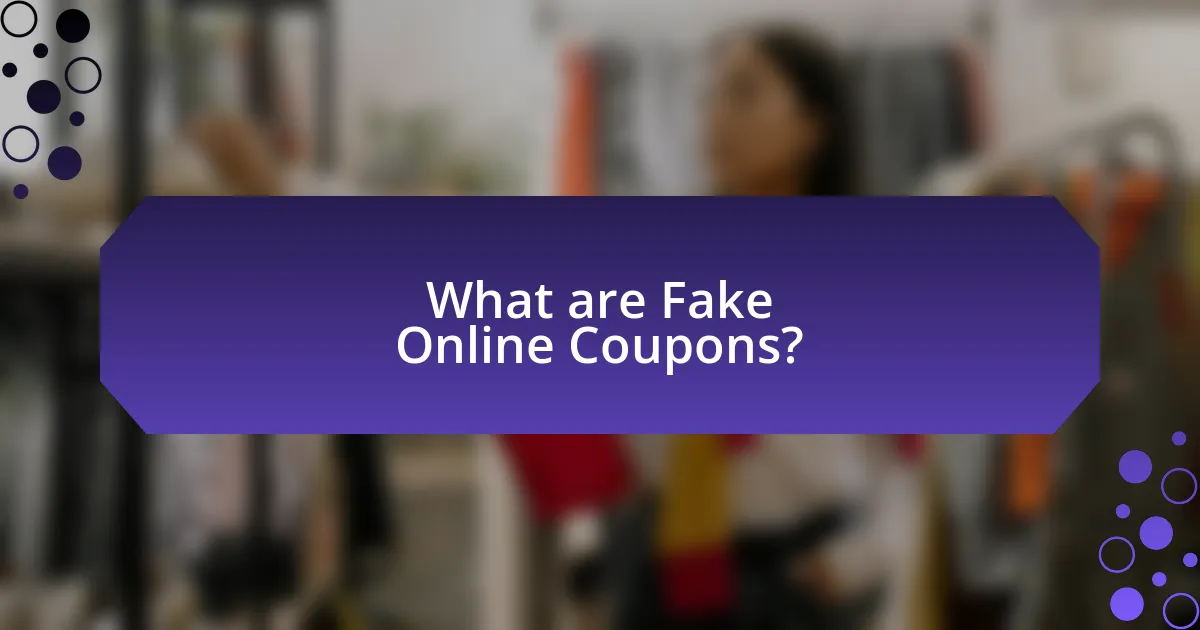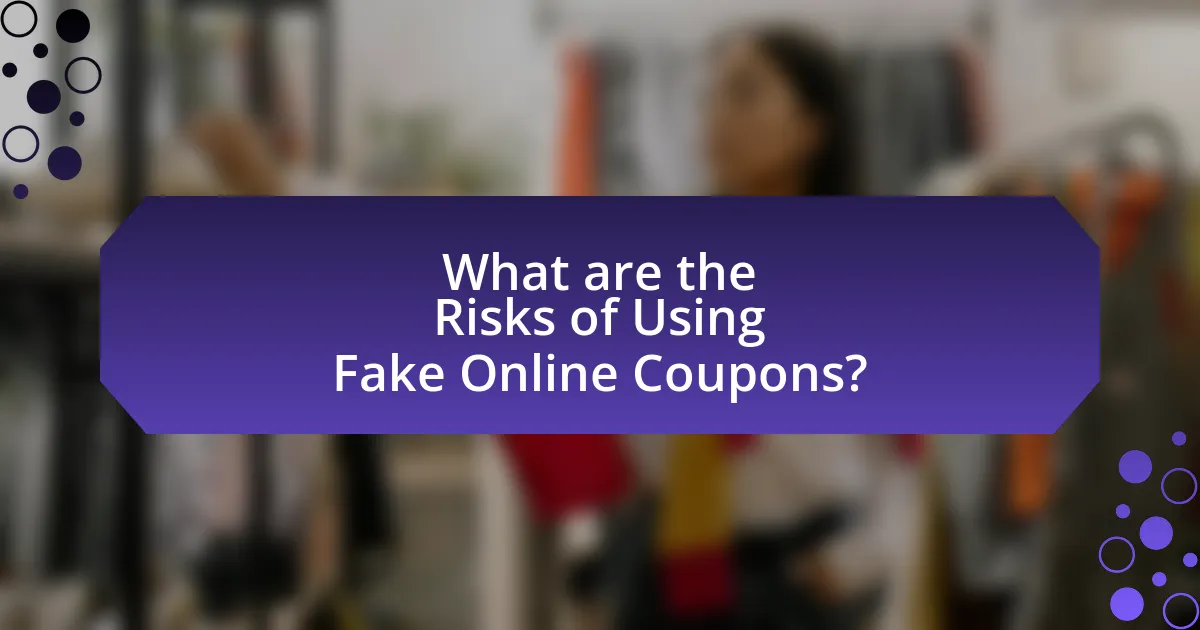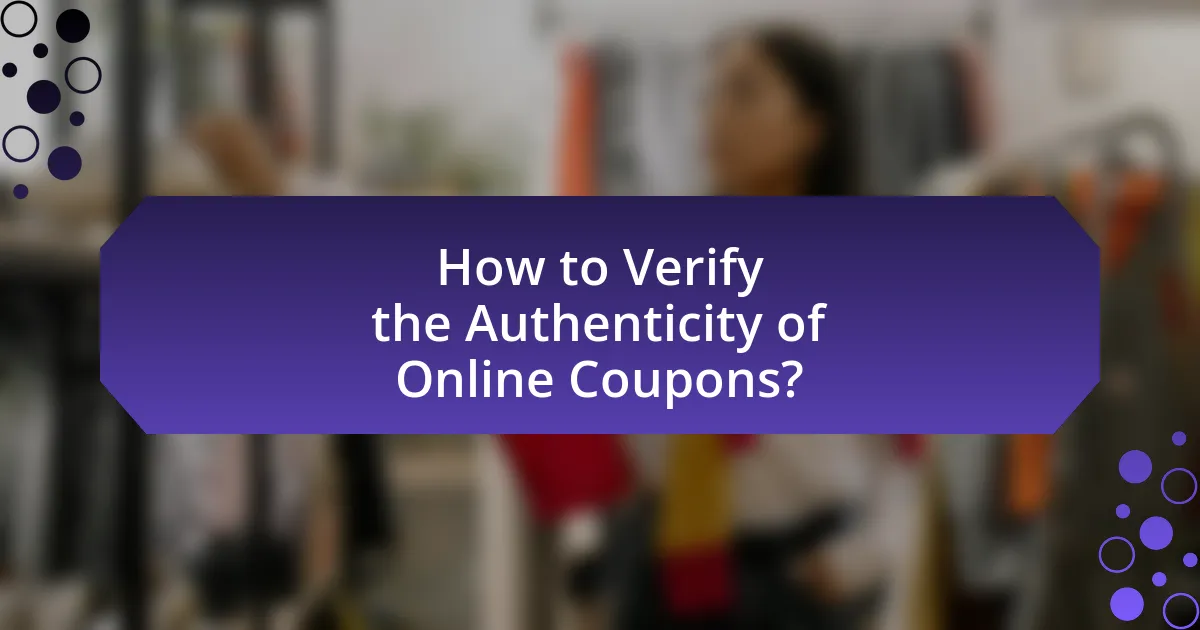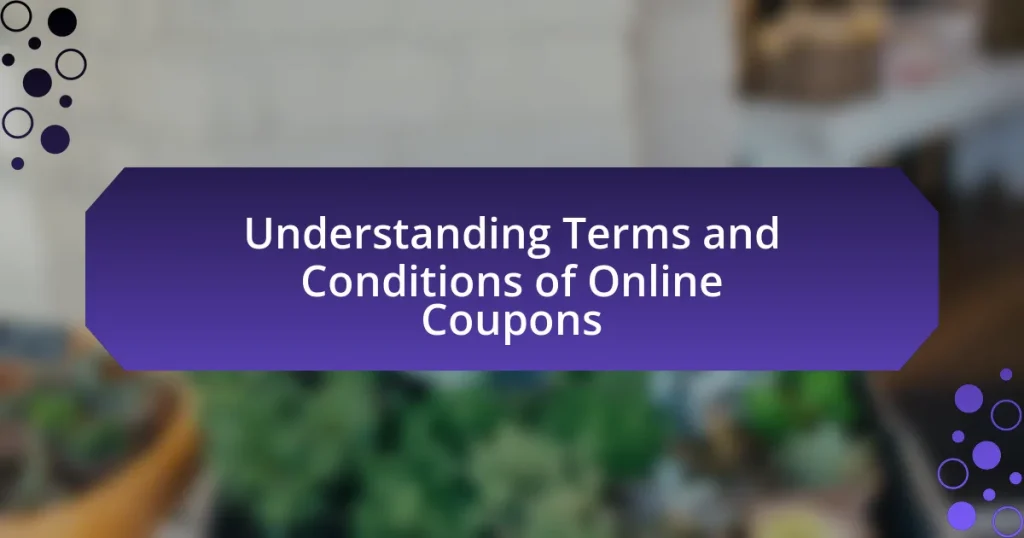Fake online coupons are fraudulent offers that imitate legitimate discounts but provide no actual savings, leading to significant financial losses for consumers. This article outlines how to identify fake coupons by examining their source, expiration dates, and common signs of legitimacy. It discusses the motivations behind coupon fraud, the risks associated with using counterfeit coupons, and the legal implications for consumers. Additionally, it provides practical steps for verifying coupon authenticity and best practices for safely using online coupons to avoid scams.

What are Fake Online Coupons?
Fake online coupons are fraudulent offers that mimic legitimate discounts but do not provide any actual savings or benefits. These deceptive coupons often appear on websites, social media, or email promotions, enticing consumers with unrealistic deals. According to a 2021 report by the Better Business Bureau, scams involving fake coupons have increased, leading to significant financial losses for consumers who attempt to use them.
How can you identify a fake online coupon?
To identify a fake online coupon, verify its source and check for specific signs of legitimacy. Authentic coupons typically come from reputable retailers or official websites, while fake ones may originate from unknown or suspicious sites. Additionally, look for clear expiration dates, valid terms and conditions, and proper formatting, as legitimate coupons usually have these features. Research shows that 60% of consumers have encountered fake coupons, emphasizing the importance of vigilance in verifying authenticity before use.
What common signs indicate a coupon is fake?
Common signs that indicate a coupon is fake include poor print quality, lack of a unique barcode, and unrealistic discounts. Coupons that are poorly printed often have blurry text or images, which can signal that they are not legitimate. Additionally, authentic coupons typically feature a unique barcode that can be scanned at the point of sale; if a coupon lacks this or has a generic barcode, it may be counterfeit. Furthermore, coupons offering discounts that are significantly higher than standard promotions, such as 90% off, are often too good to be true and should be scrutinized for authenticity.
How do expiration dates affect coupon validity?
Expiration dates directly determine the validity of coupons, as they indicate the last date a coupon can be used for a discount. Coupons that are presented after their expiration date are typically considered invalid and cannot be redeemed for the advertised discount. For example, a study by the National Retail Federation found that 60% of consumers check expiration dates before using coupons, highlighting their importance in ensuring that the coupon is still valid. Therefore, expiration dates serve as a critical factor in assessing whether a coupon can be legitimately used.
Why do people create fake online coupons?
People create fake online coupons primarily to deceive consumers and exploit their desire for discounts. This fraudulent activity often aims to generate illicit profits through scams, such as selling non-existent products or services. According to a report by the Better Business Bureau, scams involving fake coupons have increased, with consumers losing millions annually due to these deceptive practices. The creation of fake coupons can also serve as a method for phishing, where scammers collect personal information from unsuspecting users.
What are the motivations behind coupon fraud?
The motivations behind coupon fraud primarily include financial gain, exploitation of consumer behavior, and the desire to circumvent legitimate purchasing processes. Fraudsters aim to profit by creating counterfeit coupons or exploiting loopholes in coupon systems, which can lead to significant losses for retailers and manufacturers. According to a 2021 report by the Coupon Information Corporation, coupon fraud costs retailers approximately $1 billion annually, highlighting the financial incentive for individuals engaging in such fraudulent activities. Additionally, the ease of access to digital platforms allows fraudsters to reach a wider audience, further motivating their actions.
How does coupon fraud impact consumers and businesses?
Coupon fraud negatively impacts consumers and businesses by leading to financial losses and eroding trust. For consumers, fraudulent coupons can result in paying full price for products or services, as they may unknowingly attempt to use invalid offers. This can create frustration and dissatisfaction with brands. For businesses, coupon fraud can lead to significant revenue losses; a study by the National Association of Coupon Professionals estimated that coupon fraud costs retailers over $1 billion annually. Additionally, businesses face increased operational costs due to the need for enhanced fraud detection measures, which can divert resources from other critical areas. Overall, coupon fraud undermines the effectiveness of promotional strategies and damages brand reputation.

What are the Risks of Using Fake Online Coupons?
Using fake online coupons poses several risks, including financial loss, exposure to scams, and potential legal issues. Financially, consumers may lose money if they attempt to use a fake coupon, as they will not receive the promised discounts, leading to overpayment. Additionally, many fake coupons are linked to phishing scams that can compromise personal information, resulting in identity theft or unauthorized charges. Legally, using counterfeit coupons can lead to prosecution, as it is considered fraud. According to the Federal Trade Commission, coupon fraud costs retailers millions annually, highlighting the prevalence and seriousness of this issue.
How can fake coupons lead to financial loss?
Fake coupons can lead to financial loss by causing consumers to spend money on products or services that they believe are discounted, only to find out that the coupons are invalid. When individuals attempt to use these counterfeit coupons, they may end up paying full price or incurring additional fees, resulting in unexpected expenses. According to a study by the Coupon Information Corporation, counterfeit coupons cost retailers and manufacturers an estimated $1.3 billion annually, indicating the significant financial impact of such fraudulent activities.
What are the potential consequences of using a fake coupon?
Using a fake coupon can lead to legal repercussions, financial loss, and damage to consumer trust. Retailers may pursue legal action against individuals who attempt to use counterfeit coupons, as this constitutes fraud. Additionally, consumers may lose the value of the discount they expected, resulting in higher out-of-pocket expenses. According to the Federal Trade Commission, coupon fraud costs retailers millions annually, which can lead to stricter enforcement measures against fraudulent activities.
How can fake coupons compromise personal information?
Fake coupons can compromise personal information by tricking individuals into providing sensitive data through fraudulent websites or phishing schemes. These deceptive offers often require users to enter personal details, such as names, addresses, and credit card information, under the guise of redeeming a discount. According to the Federal Trade Commission, consumers reported losing over $1.9 billion to fraud in 2020, highlighting the risks associated with sharing personal information in response to fake promotions.
What legal implications exist for using fake coupons?
Using fake coupons can lead to criminal charges, including fraud and forgery, as they violate laws against deceptive practices. Engaging in the use of counterfeit coupons can result in civil penalties, including fines and restitution to affected businesses. For instance, the Federal Trade Commission enforces laws against deceptive advertising, which encompasses the use of fake coupons, and violators may face legal action. Additionally, retailers may pursue legal remedies for losses incurred due to the fraudulent use of coupons, further emphasizing the serious legal consequences associated with this activity.
What laws govern coupon fraud and misuse?
Laws governing coupon fraud and misuse primarily include the Federal Trade Commission Act, which prohibits deceptive advertising practices, and the National Consumer Protection Act, which addresses unfair or deceptive acts in commerce. These laws are enforced to protect consumers from fraudulent coupon schemes and ensure that businesses adhere to truthful marketing practices. Additionally, state laws may also apply, varying by jurisdiction, to further regulate coupon distribution and usage. For instance, many states have specific statutes that criminalize coupon fraud, including the use of counterfeit coupons or the unauthorized reproduction of promotional offers.
How can consumers protect themselves legally?
Consumers can protect themselves legally by understanding their rights and being vigilant about the authenticity of online coupons. They should verify the legitimacy of coupon sources, read the terms and conditions carefully, and report any fraudulent activities to relevant authorities. According to the Federal Trade Commission, consumers have the right to seek redress for deceptive practices, which reinforces the importance of being informed and proactive in identifying fake offers.

How to Verify the Authenticity of Online Coupons?
To verify the authenticity of online coupons, check the source from which the coupon is obtained. Authentic coupons are typically found on reputable retailer websites, official brand pages, or trusted coupon sites. Additionally, examine the coupon for specific details such as expiration dates, terms and conditions, and unique codes. Coupons that lack these details or have generic codes may be fraudulent. According to a 2021 study by the Coupon Information Corporation, approximately 10% of coupons are counterfeit, highlighting the importance of verifying their legitimacy.
What steps can you take to verify a coupon’s legitimacy?
To verify a coupon’s legitimacy, check the source from which you obtained the coupon. Legitimate coupons are typically found on official retailer websites, reputable coupon sites, or through verified promotional emails. Additionally, examine the coupon for specific details such as expiration dates, terms and conditions, and any unique codes. Authentic coupons usually have clear guidelines and restrictions. Furthermore, you can cross-reference the coupon with the retailer’s official website or customer service to confirm its validity. This method is effective because many retailers maintain updated lists of valid promotions and can quickly inform you if a coupon is genuine.
How can you check the source of the coupon?
To check the source of a coupon, verify its origin by examining the website or platform where it was found. Authentic coupons are typically issued by reputable retailers or manufacturers and can often be found on their official websites or authorized promotional channels. Additionally, look for contact information or customer service links on the coupon’s source page, as legitimate companies provide support for their promotions. Checking for user reviews or feedback about the coupon can also help confirm its validity, as many users share their experiences with specific offers.
What tools or websites can help verify coupons?
Websites such as RetailMeNot, Coupons.com, and Honey can help verify coupons. These platforms aggregate verified coupon codes and provide user feedback on their validity. RetailMeNot features a community-driven approach where users can report expired or fake coupons, ensuring that the codes listed are accurate. Coupons.com offers a selection of printable and digital coupons that are regularly updated, while Honey automatically applies the best available coupon codes at checkout, increasing the likelihood of using valid offers.
What are best practices for using online coupons safely?
To use online coupons safely, verify the source of the coupon before applying it. Trusted websites, such as official retailer pages or reputable coupon aggregators, are less likely to host fraudulent offers. According to a 2021 study by the Better Business Bureau, 60% of consumers reported encountering fake coupons, emphasizing the importance of sourcing from reliable platforms. Additionally, avoid sharing personal information unless necessary, as legitimate coupon sites typically do not require sensitive data. By adhering to these practices, users can minimize the risk of scams and ensure a secure shopping experience.
How can you avoid scams while searching for coupons?
To avoid scams while searching for coupons, verify the legitimacy of the coupon source before using it. Trusted websites, such as official retailer sites or well-known coupon aggregators, typically provide valid coupons. According to a 2021 survey by the Coupon Information Corporation, 60% of consumers reported encountering fake coupons, highlighting the importance of using reputable sources. Additionally, look for signs of legitimacy, such as clear terms and conditions, and avoid sites that require personal information or payment for access to coupons.
What tips can help you spot red flags in coupon offers?
To spot red flags in coupon offers, examine the legitimacy of the source and the terms of the offer. Authentic coupons typically come from reputable retailers or official websites, while suspicious offers may originate from unknown or unverified sources. Additionally, be wary of offers that seem too good to be true, such as extreme discounts or unrealistic conditions, as these often indicate fraudulent schemes. Research shows that 60% of consumers have encountered fake coupons, highlighting the importance of vigilance. Always check for expiration dates and specific usage restrictions, as legitimate coupons will clearly outline these details.
What should you do if you suspect a coupon is fake?
If you suspect a coupon is fake, you should verify its authenticity by checking the issuing retailer’s website or contacting their customer service. Retailers often provide information about valid promotions and can confirm whether a coupon is legitimate. Additionally, examine the coupon for signs of tampering, such as poor-quality printing or unusual formatting, as these can indicate a counterfeit. According to the Federal Trade Commission, legitimate coupons typically have specific terms and conditions, and any discrepancies should raise suspicion.



